Introduction
In the world of business, the allure of franchise ownership often shines brightly, promising a path to entrepreneurship with the backing of established brands. However, this journey is not without its complexities, as potential franchisees must navigate a landscape filled with various costs, financing options, and critical evaluation factors.
From the initial fees that grant access to a franchise to the ongoing royalties that support brand growth, understanding these financial commitments is essential for making informed decisions. Additionally, weighing the pros and cons of franchise ownership can illuminate the potential rewards and challenges that lie ahead.
This article delves into the intricacies of franchise costs, financing strategies, and key considerations to empower aspiring franchise owners on their path to success.
Understanding Franchise Costs: Initial Fees and Investment Requirements
When contemplating business ownership, it is crucial to understand how much to buy franchise and the various initial costs involved. These typically include:
- Franchise Fee: This upfront cost grants you the rights to operate under the franchisor’s established brand and can range significantly, with some fees reaching up to several hundred thousand dollars. For instance, Dunkin’ charges an initial licensing fee that can reach as high as $90,000.
- Equipment and Supplies: Depending on the nature of the business, investment in specific equipment or supplies is often necessary. These costs can vary widely based on the business’s operational needs.
- Location and Leasehold Improvements: Securing a suitable location involves costs such as deposits, first-month rent, and potentially extensive renovations to comply with brand standards.
- Training Expenses: Many franchisors offer crucial training for new business owners, which may involve additional costs associated with travel and lodging.
- Legal and Professional Fees: Engaging professionals to review contracts and agreements is a prudent step that can help prevent future legal complications, though it requires additional funding.
Furthermore, the overall funding range for a Kumon business varies between $73,000 and $154,000, offering another viewpoint on business expenses. It is also important to note that Chick-fil-A franchisees do not possess the enterprise; the company retains ownership of the land, building, and equipment, operating more like a rental agreement. Understanding how much to buy franchise is essential for effective budgeting, ensuring you are financially prepared before embarking on your franchise journey.
As Eric Stites, founder and CEO of Franchise Business Review, aptly states, “For many people, the choice of going into business is about building long-term wealth through equity… building a valuable asset that you can ultimately sell or pass on to your family.” Understanding the complete range of initial expenses can guide you on a path toward a successful and fulfilling financial venture.
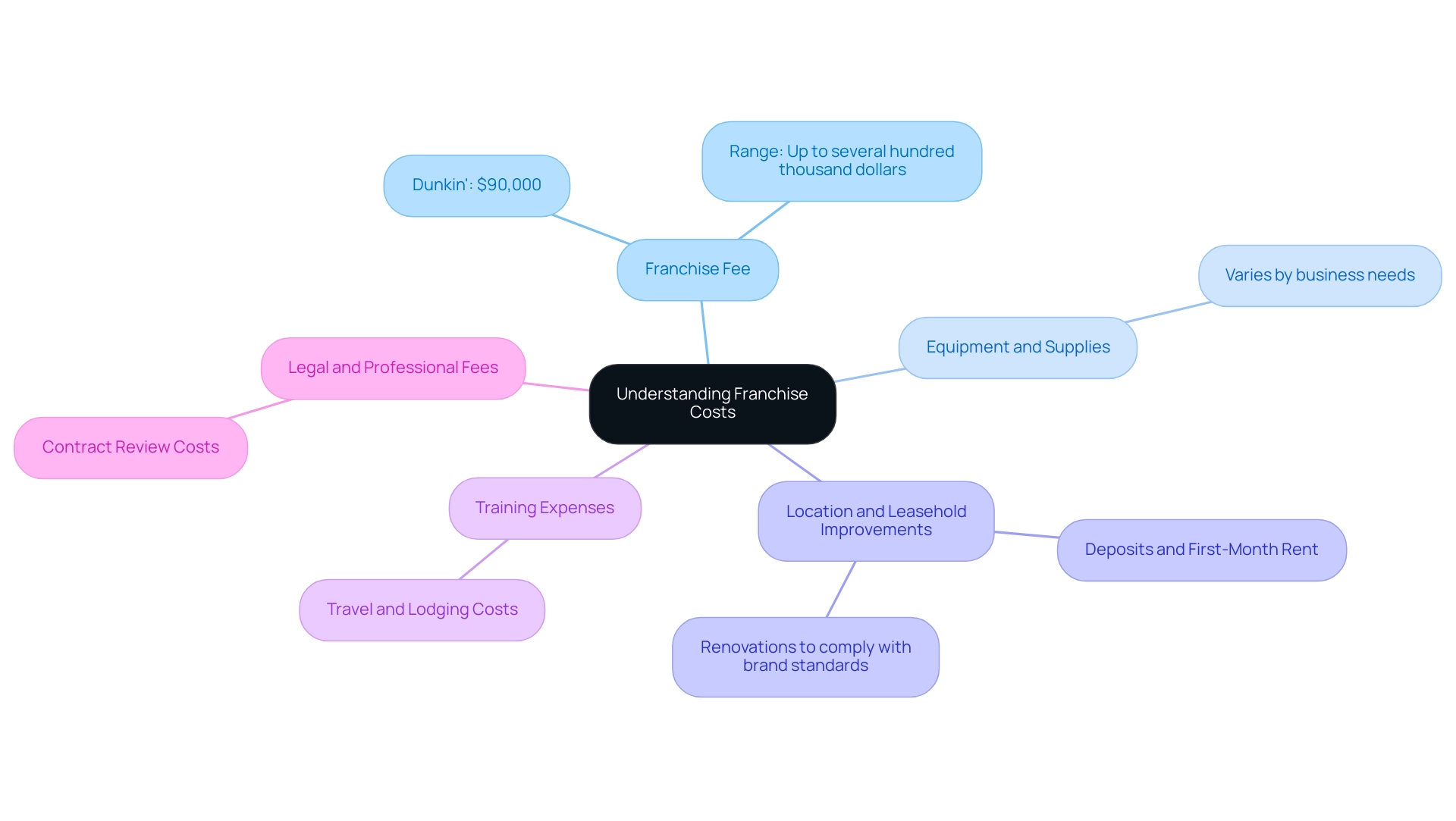
Ongoing Costs of Franchise Ownership: Royalties and Additional Fees
Owning a chain involves several ongoing expenses that can greatly affect your profitability. Understanding how much to buy franchise expenses is crucial for prospective business owners who want to evaluate the viability of their investment. Key expenses typically include:
- Royalty Fees: These are generally calculated as a percentage of gross sales and serve as compensation to the franchisor for brand support, resources, and ongoing operational assistance. Royalty fees typically vary from 4% to 8% of monthly sales, representing a critical aspect of business ownership. Notably, franchisors often use these fees to invest in innovations and growth, thereby benefiting franchisees through improved products, technology, and increased brand awareness.
- Advertising Fees: Many franchises require contributions to a national or regional advertising fund, which often falls between 1% to 3% of sales. This investment is essential for promoting brand awareness and driving customer traffic.
- Operational Costs: Daily operational expenses include utilities, rent, payroll, and other essential costs of running an enterprise. These can vary significantly based on the business type and location. For example, P3 Cost Analysts, which utilizes a business model designed to assist organizations in lowering operating expenses across sectors like telecom, waste, and utilities, has a structure that supports operational efficiency, with 100% of its employees working remotely.
- Insurance: Franchise owners are required to maintain various insurance policies, such as liability and property insurance. These premiums can accumulate, representing a substantial ongoing expense in the budget.
- Technology and Software Fees: Many businesses mandate the use of specific technology platforms or point-of-sale systems, which often come with subscription fees. Keeping up with technological advancements is crucial for operational efficiency and customer service.
Lisa, the Chief Customer Officer at FranConnect, stresses the significance of these support structures, stating, “Our goal is to ensure that those operating franchises have all the resources they need to succeed in their business endeavors.”
By understanding these ongoing expenses, potential business owners can determine how much to buy franchise and create informed financial strategies that align with their financial objectives and ensure effective business management.
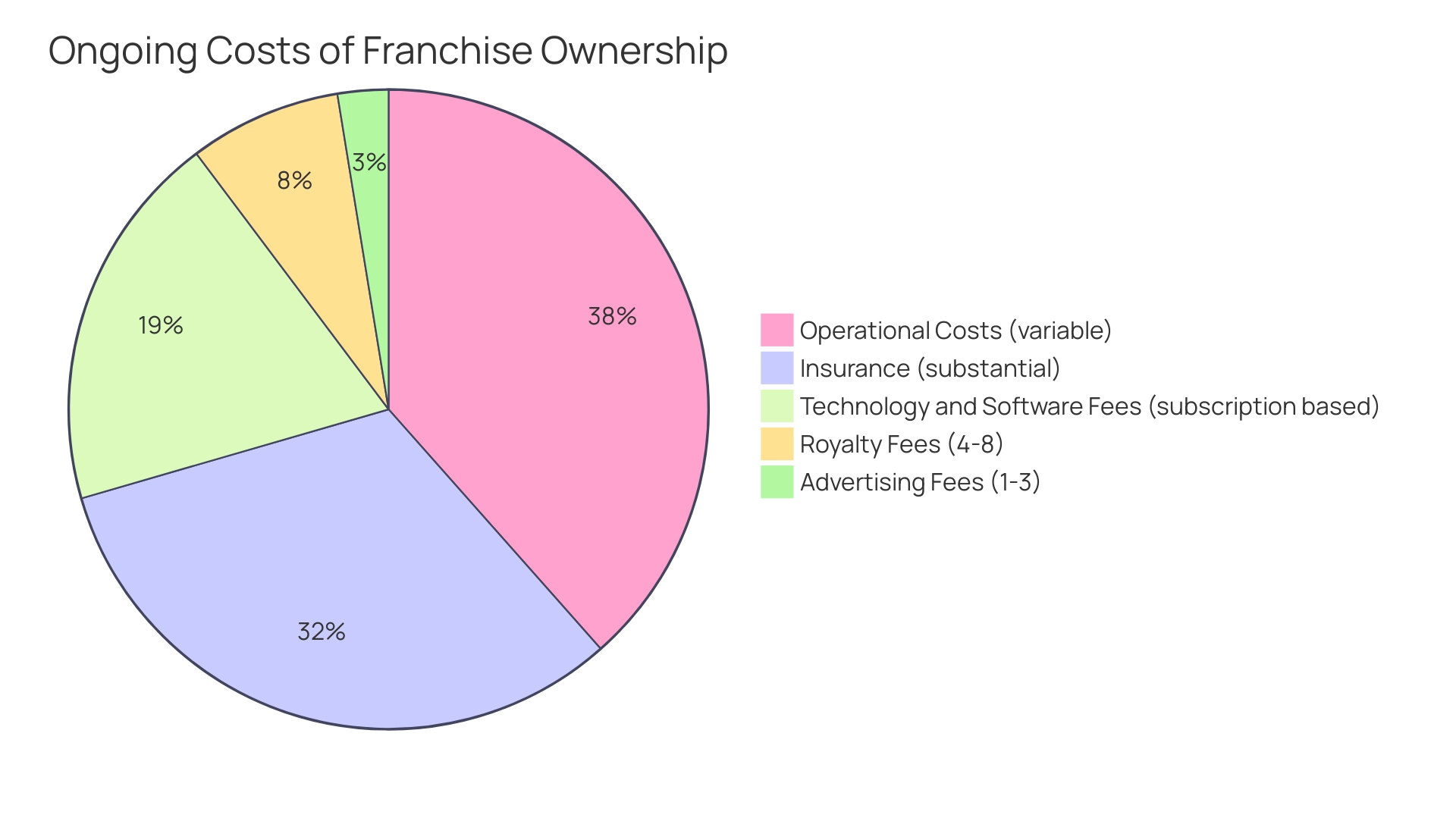
Financing Your Franchise: Options and Strategies
Funding a business opportunity can seem daunting, but there are several options available to potential owners:
- Personal Savings: Utilizing personal savings from checking and savings accounts can be a straightforward way to finance the initial investment, minimizing debt and effectively using cash equivalents. This self-funding mechanism allows you to maintain control over your finances.
- Bank Loans: Conventional bank loans are a frequent option; however, prospective operators should prepare a robust plan to present to lenders, ensuring they comprehend the model and its potential for success.
- SBA Loans: The U.S. Small Business Administration provides funding options specifically tailored for small enterprises, including franchisees. These loans can provide favorable terms and lower interest rates, making them an attractive choice for new owners.
- Franchisor Financing: Some franchisors provide funding options or have connections with lenders who comprehend their business model, facilitating the acquisition of capital suited to your business’s requirements.
- Investors: Engaging with angel investors or leveraging personal networks of friends, family, and colleagues can provide necessary capital while sharing the risks involved in business ownership. Angel investors often bring not just funding but also valuable expertise and connections.
By evaluating these financing strategies, you can determine which options best align with your financial situation and goals. For more information on each funding option, consider exploring the read more links associated with each service, ensuring a well-informed approach to your business journey.
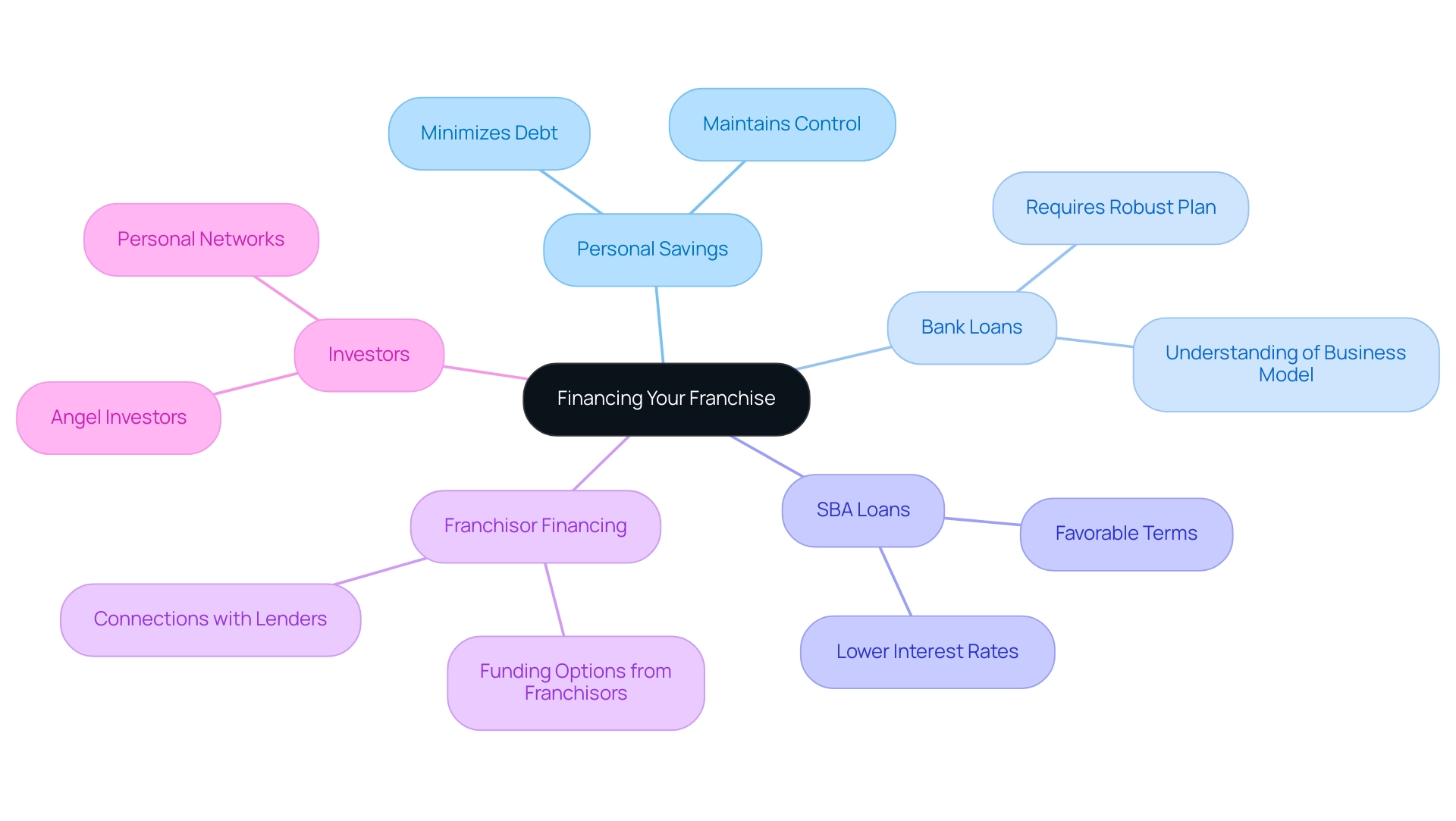
Evaluating Franchise Opportunities: Key Factors to Consider
When examining different business opportunities, it is crucial to evaluate several key factors to ensure a sound investment decision:
- Franchise History: Examine the background of the business, concentrating on its growth trajectory, market stability, and overall reputation. A business with a solid history often indicates reliability and potential for future success. Insights from recent studies suggest that businesses with established histories are more likely to adapt successfully to market changes.
- Profitability: Scrutinize financial disclosures to gain insights into average sales figures, profit margins, and anticipated return on investment. Comprehending these metrics is essential for evaluating the financial sustainability of the business. According to findings from semi-structured interviews with service firms, businesses that prioritize product and service innovation tend to show higher profitability rates.
- Support Systems: Consider the training and ongoing support provided by the franchisor. A robust support system can significantly enhance your chances of success, especially for first-time business owners. The case study on franchising growth factors in Malaysia highlights that strong franchisor-franchisee relationships contribute positively to franchisee satisfaction and overall success.
- Market Demand: Assess the local demand for the business’s products or services. Conducting market research will help you identify if there is a viable customer base in your intended location. The study emphasizes the importance of understanding local demand as a critical growth factor for franchises.
- Franchisee Satisfaction: Engage with current franchisees to hear firsthand accounts of their experiences and satisfaction levels with the franchisor. Their insights can reveal potential challenges and benefits that may not be immediately evident. The results indicate that chains with greater operator satisfaction levels frequently demonstrate superior overall performance.
By carefully evaluating these essential factors, including the funding aspect and acknowledging the higher-potential risk and reward nature of chain operations, you equip yourself to make a knowledgeable choice that corresponds with your career goals and increases your chances for success in the chain environment. These considerations not only reflect current trends but also provide avenues for future research in the field of franchising.
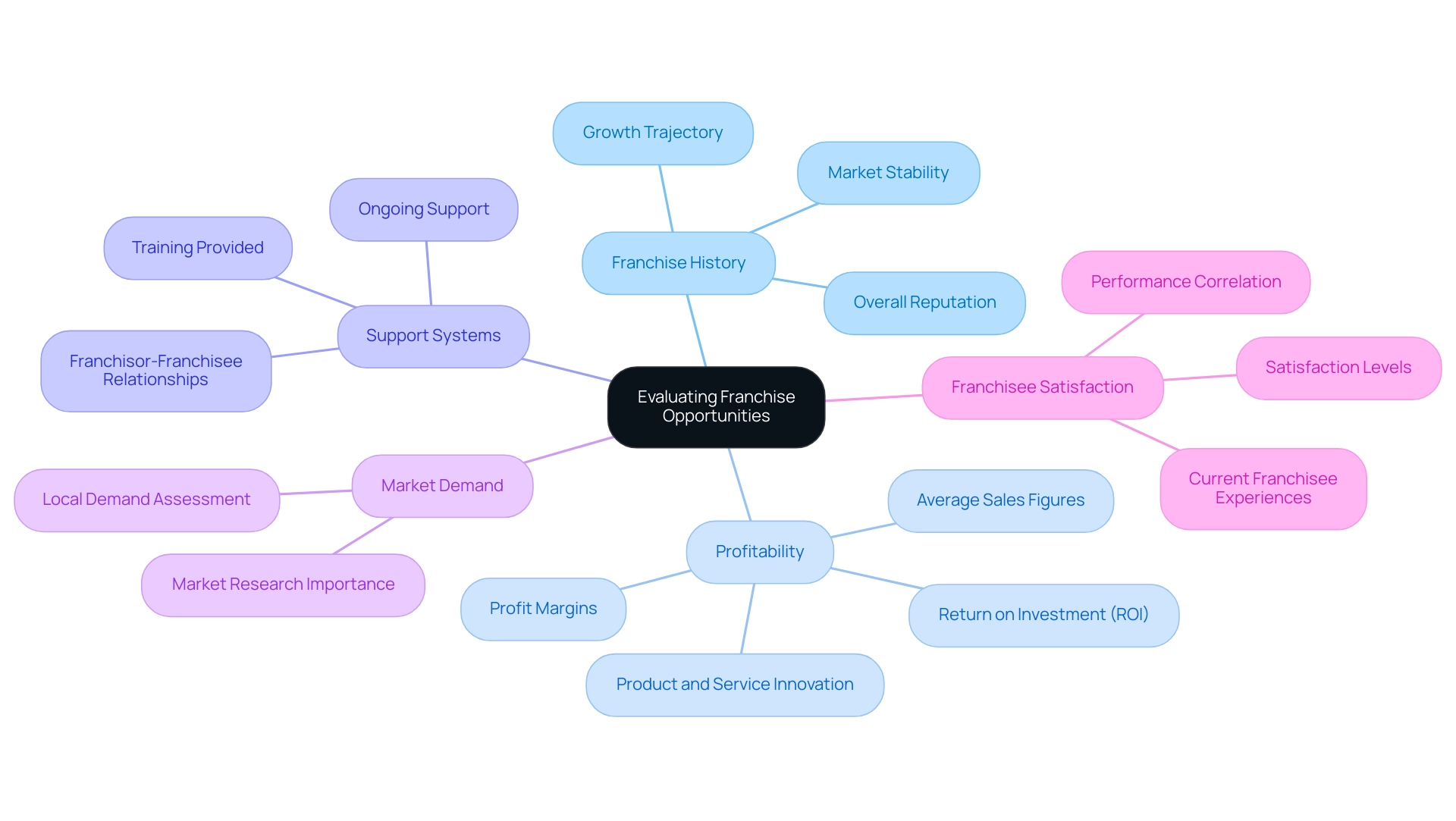
Pros and Cons of Franchise Ownership: Weighing Your Options
When contemplating an investment in a franchise, it’s crucial to evaluate both the benefits and drawbacks:
Pros:
- Established Brand: Franchisees gain immediate access to the recognition and reputation of a well-known brand, which can significantly enhance customer attraction and retention.
- Support and Training: Franchisors frequently offer extensive training, marketing assistance, and continuous operational guidance, as illustrated in the at Work Advantage case study, which shows how at Work provides a proven model with comprehensive support for franchisees.
- Lower Risk: Franchises generally enjoy a lower failure rate compared to independent businesses, thanks to their proven business models and established operational frameworks.
- Access to Financing: Financial institutions are typically more willing to support business chains, acknowledging their proven histories and reduced risk profiles.
- Community: Franchise owners often become part of a supportive network of fellow franchisees, fostering valuable opportunities for networking and collaboration.
Cons:
-
Initial and Ongoing Costs: When considering how much to buy franchise, it is important to note that investing in a business venture involves considerable upfront fees and ongoing royalties, which can significantly reduce profit margins.
For instance, understanding how much to buy franchise is essential, as royalties from the business model typically range from 4% to 12% or more of the revenue, impacting overall earnings.
-
Limited Control: Franchisees are required to operate within the framework set by the franchisor, which may restrict their ability to innovate or adapt their business practices independently.
-
Market Saturation: In certain scenarios, franchisors may oversaturate a market by permitting too many establishments in close proximity, leading to heightened competition among owners.
-
Contractual Obligations: Franchise agreements can be intricate, often containing restrictive clauses that may limit operational flexibility and decision-making.
-
Reputation Risks: Any negative publicity surrounding the franchisor can adversely affect all franchisees under the brand umbrella, making it essential to consider the long-term reputation of the franchisor.
By carefully weighing these pros and cons, you can arrive at a more informed decision regarding whether franchise ownership aligns with your personal aspirations and professional objectives.
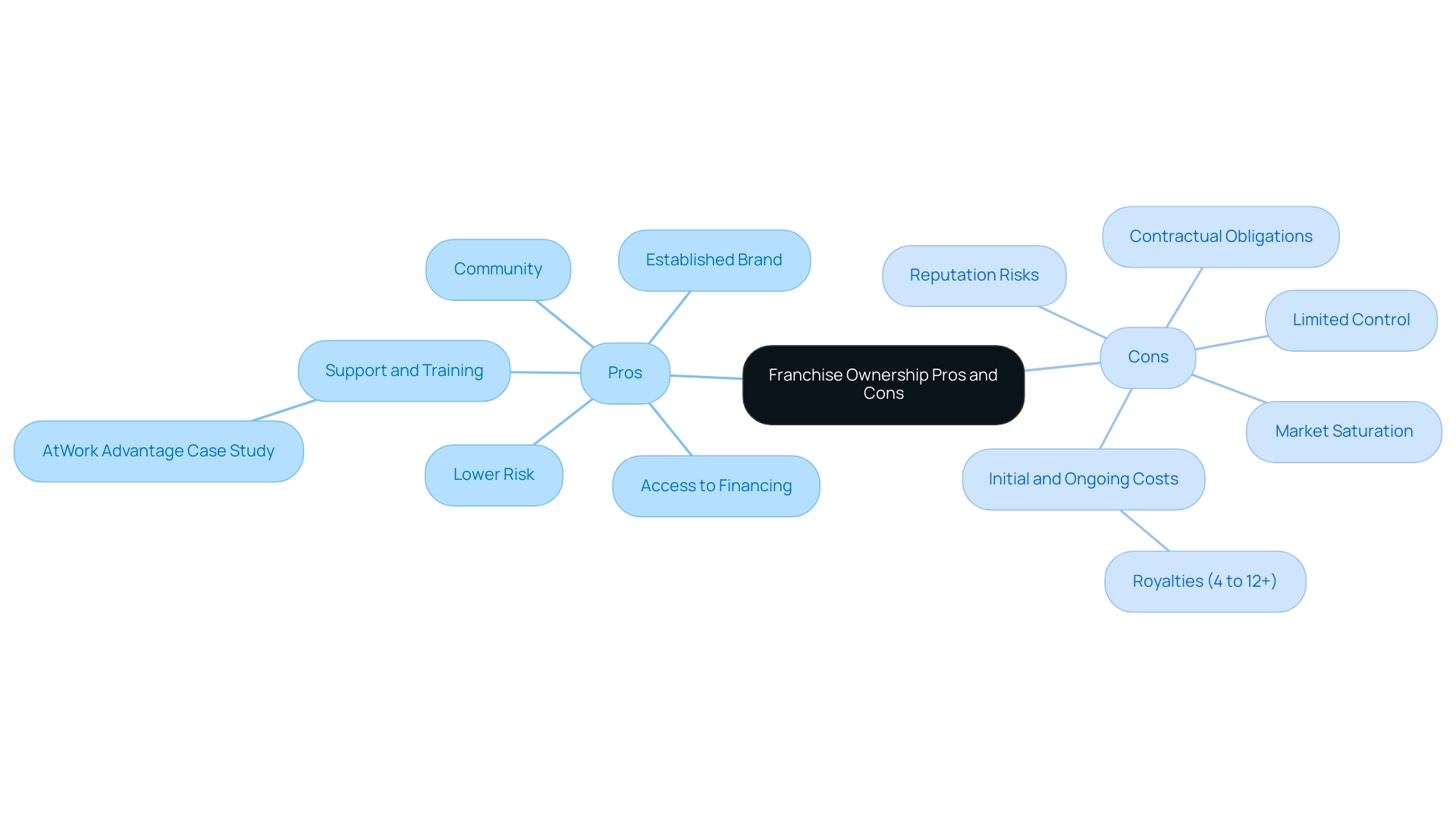
Conclusion
The journey to franchise ownership is filled with both promise and complexity. Understanding the various costs involved, from initial franchise fees to ongoing royalties, is crucial for anyone considering this path. The article highlights the importance of being well-informed about both the upfront and ongoing financial commitments, which can significantly impact profitability and overall success.
Equally important is the evaluation of financing options available to potential franchisees. From personal savings and bank loans to franchisor financing and investor involvement, each option presents unique advantages and considerations. Selecting the right financing strategy can set the foundation for a successful franchise venture.
Moreover, careful assessment of franchise opportunities is vital. Factors such as franchise history, profitability, support systems, market demand, and franchisee satisfaction should all be taken into account. By conducting thorough research and analysis, prospective franchise owners can make informed decisions that align with their career aspirations.
Ultimately, weighing the pros and cons of franchise ownership is essential for determining whether this path is the right fit. While the benefits of established brands and support structures are appealing, the potential drawbacks, such as high costs and limited control, must not be overlooked. By approaching franchise ownership with a clear understanding of these elements, aspiring entrepreneurs can navigate the complexities and position themselves for a rewarding investment.


